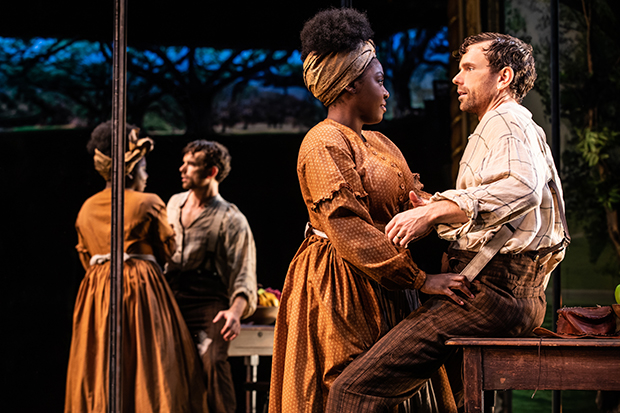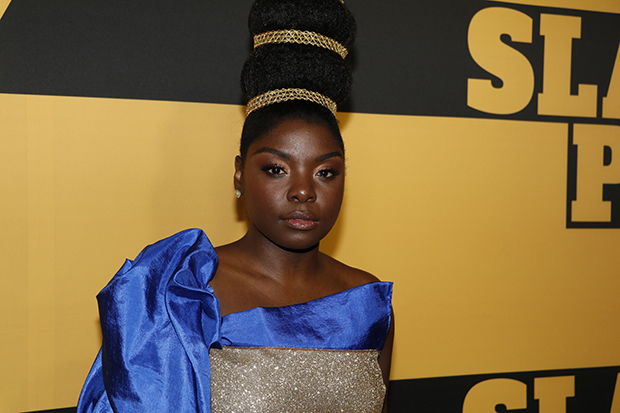Final Bow: How Slave Play Taught Joaquina Kalukango to Get Out of Her Own Head
The star of Jeremy O. Harris’s Broadway drama learns how to not let people’s responses get in the way of storytelling.
In Jeremy O. Harris's groundbreaking Broadway drama, Slave Play, Joaquina Kalukango stars as Kaneisha, an African-American woman undertaking a radical kind of sexual therapy in an effort to reawaken her relationship with her white husband.
When she first read the script, she didn't know what to make of it. Even now, after having performed the piece for nearly five months at the John Golden Theatre, Kalukango still isn't sure that she's gotten a "complete grasp" on Kaneisha's full journey. However, she is sure of one thing: Doing this play, acting in this role, has changed her.
As Slave Play ends its run, Kalukango looks back at this moment in her career, which she calls "an act of service and grace and love."

(© Matthew Murphy)
1. What is your favorite line that you get to say?
"I feel like I haven't used my voice enough."
2. What was the worst technical difficulty you experienced during the run, and how was it handled?
We've only had one issue and it happened last week. The doors wouldn't close, so there was a whole bed set that was still onstage while we were transitioning into the therapy [scene]. It was stuck like that for like 20 minutes. We sat backstage to see if it would be worked out, but our crew was great and figured it out.
3. What is the most interesting present you received at the stage door?
When I was in high school, I did a program called NFA Arts. It has all these kids competing in different categories, and if you win, you get scholarship money. I went for drama, and I won $5,000. One of the judges from back in the day came to see the show and left me a journal from the competition, and it's full of quotes from the winners. I thought that was really sweet.
4. Who is the coolest person to come see the show?
It might be a tie between 3 people: Donald Glover, Lena Waithe, and Janelle Monáe. I thought that they were really cool, interesting, artistic people.
5. How have your thoughts about Kaneisha, the character, evolved from first reading to now?
I think when I first read it, I didn't know who she was. I was like "What kind of person signs up for this kind of therapy?" [laughs] After fully living in it, and doing research, and getting a deeper understanding of who this woman is and who she's married to and their relationship, and particularly understanding what it's like to live with disorders and how to maneuver in a world where you're triggered, I have a deeper respect for her. I don't think I'll ever have a complete grasp because she changes so much in the moment. Jeremy gives so much freedom to the actor portraying her. She's deeply complex.

(© Janie Willison)
6. What were the Black Out performances like for you?
It honestly felt like church. For the first time, I felt like I was walking to a space where I no longer had to carry racial trauma on my shoulders by myself. I had 800 people to carry it with me. We all felt seen, we all felt heard. Our people are some of the most vocal audiences on the planet, and to feel their spirit and love and angst, it was such a visceral, beautiful experience and something that I don't get to experience a lot.
7. Kaneisha is a very heavy role. What kind of toll does her journey take on your body and mind?
Sometimes, I feel completely free by the end, like I've released it. Sometimes it stays with me, and I think the last time that happened, I stayed awake until 5am. That was way earlier in the run. My mind wouldn't quiet and I had to meditate. Physically, I didn't quite understand how much tightness gets carried in your body and where it sits. Our producers give us massages during the week. When I'm getting work done, I see where I'm carrying it.
8. What's the best piece of advice you can impart on all the future actors who are going to play Kaneisha? Did your friend who played it off-Broadway, Teyonah Parris, give you any advice?
She just said, "Do you." She didn't want to give me anything. I think it's so personal to who you are. So my best advice is to be fearless. Be vulnerable. Take care of yourself. Make sure you do all the things to keep yourself healthy, because it is going to cost you something mentally, physically, and emotionally. Practice self-care. And never put yourself into a situation where it hurts too much. And if it hurts too much, get out.
9. How has doing Slave Play on Broadway changed you as an actor and a person?
Because this material can so easily trigger you, as the actor doing it, in how you move about the world, it has taught me that each time I do it, it's an act of service and grace and love I can send out, and I have to trust that the people are getting it regardless of the response.
That is something I had to learn while going through this process. Before, I would let other people's energies effect my spirit. I had to say to myself, "You don't know what's going on with people's minds," in the same way that I was very confused the first time I read it.
The level of grace that I gave myself, and also the audience, to go through whatever they're going through as they experience this piece, has taught me to get out of my own head. At the end of the day, it's not about you. It's about the story that you're telling, and you have to trust that your truth will somehow reach somebody.







